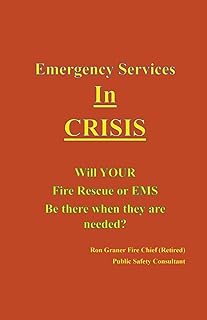Oferta de
Emergency Services In Crisis - Will Your Fire Rescue or EMS Agency Be There When They Are Needed?
Mais ofertas de Generico
R$ 211,00
* Confira sempre o valor atualizado antes de efetuar a compra.
Mais informações do Produto
Emergency Services In Crisis - Will Your Fire Rescue or EMS Agency Be There When They Are Needed?
Fire Rescue and Emergency Medical Service agencies around the nation today are in danger of failing to be able to continue to serve and protect the public. They will also fail to protect those who serve in those agencies.
The dangerous conditions in many emergency service agencies go far beyond the acknowledged issues of fewer Volunteers, an aging Volunteer base, fewer young people willing or able to volunteer, and fewer people are willing to take the required risks to their health and lives of being career emergency responders, unstaffed stations, facilities that do not meet the needs of today's emergency responders, aging populations requiring more services, increased service demands, increased drug use in every community, apparatus not designed for today's needs, lack of training, and lack of sufficient funding.
While each of these conditions is vitally important to every emergency service agency, the most severe problems in the vast majority of agencies today include unsustainable and outdated funding mechanisms, taxpayers who demand lower taxes, agencies that continue to operate with apparatuses and equipment that are incompatible with neighboring mutual aid agencies, agencies that are still funding unnecessary equipment or apparatus readily available in neighboring stations. The most dangerous and costly fact affecting the above problems is that most of our emergency services are still organized as single- or two-station stand-alone agencies and administered by structures created in the 19th and 20th centuries. The centuries-old dangerous lack of cost-effective and efficient administrative coordination continues to exist across the nation.
If the lack of coordination and duplication of administrative duties continues, many agencies can no longer respond to emergencies safely. These worsening conditions will undoubtedly lead to injuries and deaths of emergency responders and the public. Failure to address these issues will ultimately destroy the emergency services that have served communities for centuries. These issues must be handled promptly, not only by the leaders of every emergency service agency but also by the elected and appointed public officials and the people of the communities being served. Failure of these groups to work together to solve these problems and create administrative structures that meet today's needs will cause emergency service agencies to be unable to continue to serve their communities.
Mais sobre este produto

Emergency Services In Crisis - Will Your Fire Rescue or EMS Agency Be There When They Are Needed?
R$ 211,00
* Confira sempre o valor atualizado antes de efetuar a compra.



